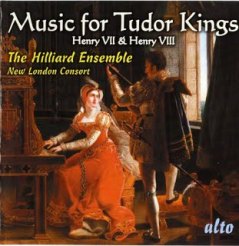Music for Tudor Kings Henry VII & Henry VIII (2007)
Music for Tudor Kings Henry VII & Henry VIII (2007)

Songs from the time of Henry VII: I Love Unloved (Fayrfax) Woefully Arrayed (Cornysh) That Was My Woe (Fayrfax) Ah Gentle Jesu (Sheryngham) Most Clear of Colour (Fayrfax) Hoyda Hoyda, Jolly Rutterkin (Cornysh) Songs and music from the time of Henry VIII: O Lusty May This Day Daws Begone Sweit Night En Vray Amoure O My Heart Madame d'amours Consort Piece XX Absent I Am My Heartly Service Hey Trolly Lolly Lo ! En Frolyk Weson Be Peace! Ye Make Me Spill My Ale ! The Duke of Somersette's Dompe Ah Robin I Love Unloved Up I Arose in Verno Tempore Puzzle Canon VI And I Were a Maiden England Be Glad Hilliard Ensemble New London Consort
These discs come from LPs recorded in the 1970s -- unfortunately the reader of the booklet does not learn exactly where or when from the booklet, which is also something of a graphic design catastrophe. The Hilliard Ensemble, formed in 1974, took a great leap forward in the investigation and performance of English Renaissance music. It took its name not from baritone and leader Paul Hillier but from that of an Elizabethan portraitist, Nicholas Hilliard. These discs cover a couple of generations' worth of English madrigals and other songs, interspersed with instrumental works and a few songs from other countries. None is well known even today, and all are on a level with the famous madrigals -- one of the things the Hilliard crew showed was that the Renaissance repertoire had depths that nobody beyond a few scholars had started to plumb. Overall, the performances hold up better than many others from the early days of early music. It's worth remembering that, until the relatively recent emergence of training programs specifically devoted to early music, singers had to forget almost everything they knew in order to perform this music effectively. A quick piece like Cornysh's Hoyda Hoyda Jolly Rutterkin (a rutterkin is a beguiler, in case you were wondering) comes through as an impenetrable mass of vibrato. But nowhere do the singers devote anything less than full awareness to the words they are singing, and many of the slower pieces have a refreshing presence of passion and absence of cuteness. The composers for the music on disc two are not specified, but you can figure most of them out from the booklet (two pieces are by Henry III himself, but most are anonymous). Most of the performers making music from the Renaissance era today have relied to some degree on these recordings as models, and they're still very much worth hearing. ---James Manheim, Rovi
download: uploaded yandex 4shared mediafire solidfiles mega filecloudio nornar ziddu
Last Updated (Friday, 28 February 2014 10:02)








